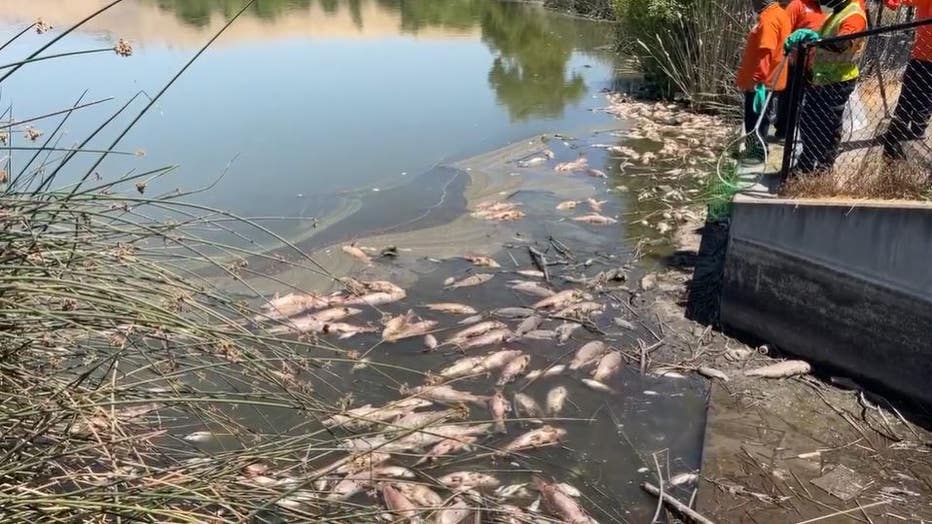Some 1,000 fish killed by heat wave in Fremont's Lake Elizabeth

Extreme heat blamed for massive fish die-off in Bay Area lake.
As many as one-thousand dead fish have been found in Lake Elizabeth, and Fremont officials say heat is to blame for the die-off. , weather, and breaking news from across the Bay Area.
FREMONT, Calif. - Extreme heat and low oxygen levels have killed up to 1,000 fish in Fremont's Lake Elizabeth this week, city officials said.
Fremont residents were shocked to see the dead fish floating in the water and washing ashore at the popular lake during the July Fourth weekend.
"Hundreds of fish are dead and coming to the surface trying to get air," Kristin Chandler told KTVU, sharing video of the fish. "Please bring this to everyone’s attention. The wildlife needs help!"
Fremont spokeswoman Geneva Bosques said the city hired a water specialist on July 4, who confirmed that the temperature in the lake is much higher than normal and the oxygen levels had lowered.
"The normal dissolved oxygen level in a lake such as this is five, and we are just under at one," said Kim Beranek, Fremont Director of Community Service.
City officials say they've pulled up to 1,000 dead fish from the lake so far. Samples have been taken for toxic algae and the results are expected next week.
Kimberly Rowe and her husband said they walk around the lake daily. They said they first noticed fish that seemed to be in distress three weeks ago and then saw fish swarming this week near the spot where fresh runoff comes from Mission Creek.

"Tuesday we were here. I mean, it drove us to tears, because they were jumping out of the water, they were gasping for air. It was very, very scary," Rowe said. "It seemed like they were congregating there to get fresh water."
On Friday, city workers were out on boats and walking the shoreline, bringing heavy bags of dead fish in for disposal.
The city says they were surprised by the number of fish being found in the lake. The city usually stocks trout and catfish for an annual fishing event in April, but most of the dead fish they are finding are giant carp and other invasive species.
"It's a shock. I don't like to see so many native animals, and they don't have the space to live," said Fremont resident Vivian Hsu.
Beranek says the city also plans to work on long-term solutions to address the impact of climate change and extreme heat conditions on the lake. That could include installing extra pumps, additional water quality monitoring, or even infrastructure projects to dredge the lake and make it deeper.
California, as well as other parts of the country, has been experiencing a prolonged heat wave with temperatures in the triple digits.
"We have sadly lost many fish over the last two days," Bosques said.
Normally, Bosques said, the cool air at night helps to lower the lake's temperatures, but that hasn't really happened over the last several days.
There was a big fish die-off in August 2022 as well. In that case, scientists concluded it was likely because of a red tide algal bloom, also inspired by heat.
Jana Katsuyama is a reporter for KTVU. Email Jana at jana.katsuyama@fox.com. Call her at 510-326-5529. Or follow her on Twitter @JanaKTVU and read her other reports on her bio page.

